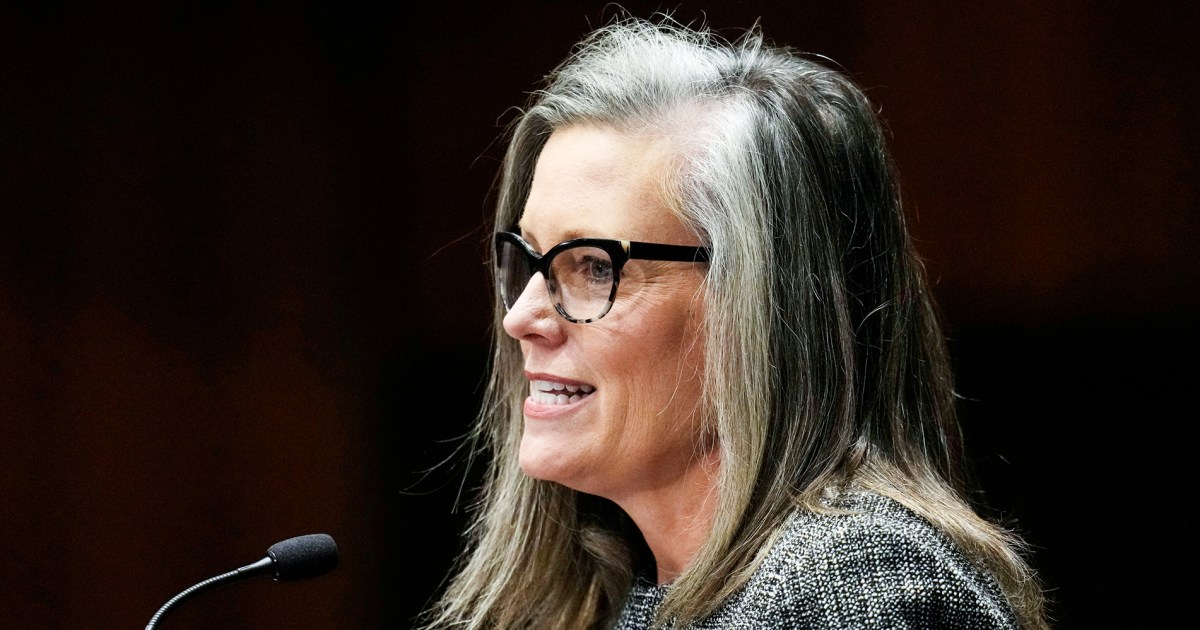
Arizona Gov. Katie Hobbs signed on Thursday a repeal of the state’s near-total abortion ban that has been on the books since the Civil War, capping a political scramble sparked by a controversial state Supreme Court ruling last month.
Flanked by Democratic lawmakers who helped wrangle the bill through the GOP-controlled Legislature, Hobbs signed the repeal inside the state Capitol one day after the state Senate passed it.
“I’ve heard from doctors who were unsure if they would wind up in a jail cell for simply doing their job, women who told me they didn’t know if it was safe to start a family here in Arizona,” Hobbs said at the signing ceremony. “These excruciating conversations are exactly why I have made one thing clear, very clear: This ban needs to be repealed.”
Her signature marked the latest chapter in the fight over abortion rights in Arizona following the state Supreme Court’s ruling to reinstate a near-total ban on abortion that first went into effect in 1864, before Arizona had even been granted statehood.
The conservative-leaning court’s decision made enforceable a law making abortion a felony punishable by two to five years in prison for anyone who performs one or helps a woman obtain an abortion. The law, which was codified in 1901 and again in 1913, after Arizona gained statehood, outlaws abortion from the moment of conception but includes an exception to save the woman’s life.
After the U.S. Supreme Court overturned Roe v. Wade — striking down federal abortion protections and handing that power to the states — legal questions popped up immediately over whether Arizona officials were obligated to enforce the 1864 law, which had never been repealed, or a 15-week ban on abortion from 2022 that was designed to snap into effect if Roe was struck down.
The Arizona Supreme Court’s April 9 ruling that the 1864 law took precedence and was enforceable sparked a national outcry — including from Republicans all the way to former President Donald Trump who demanded the state find a way to mute the effects of the ban — and set in motion a rapid chain of events in the Legislature to repeal it.
The effort, which included weeks of failed attempts to advance a repeal bill, culminated on Wednesday when the state Senate gave it final approval. A week earlier, on its third attempt in three weeks, the state House had also passed the repeal. In both closely divided chambers, a handful of Republicans (three in the state House and two in the state Senate) joined with Democrats to pass the bill.
The sequence of legislative success for the repeal was met with praise every step of the way from reproductive rights groups and Democrats, including President Joe Biden.
But even after Hobbs’ signature, the road ahead on how and what abortion restrictions will be enforced in Arizona remains complicated: The ban is still bound to go into effect for a period of time due to unique aspects of Arizona law.
Under the Arizona Constitution, a fully enacted repeal of a law doesn’t go into effect until 90 days after a legislative session concludes, unless it was passed by a supermajority in both legislative chambers.
Last year’s session ended on July 31, so if the current session were to end at a similar time, the repeal would not fully execute until late October or early November. But Arizona doesn’t have a fixed legislative calendar, meaning Republicans could also keep the session open with the intention to further delay the repeal’s implementation.
Arizona Attorney General Kris Mayes, a Democrat, said Tuesday she expected the 1864 ban to go into effect on June 27, per her office’s interpretation of state Supreme Court procedural rules, though officials and attorneys for reproductive rights groups were still working to find ways to delay that date.
When the repeal does finally go into full effect, the landscape on enforcement will still remain fluid.
A fully implemented repeal of the 1864 ban will result in state policy’s reverting immediately to 15-week ban on abortions passed in 2022 that makes exceptions for medical emergencies but not for rape or incest.
At the same time, it’s near-certain that a proposed constitutional amendment will appear on the Arizona ballot in November that will allow voters to decide on the future of abortion rights in the state.
The ballot measure would create a “fundamental right” to receive abortion care up until fetal viability, or about the 24th week of pregnancy. It would effectively undo both the 1864 near-total ban and the 15-week ban if approved by voters.
The state Supreme Court’s decision also prompted Republicans to also discuss a possible contingencies, including pushing alternative ballot measures. GOP lawmakers haven’t yet introduced any specific proposals or legislative referrals on those potential measures.
Source: | This article originally belongs to Nbcnews.com










